Donneyong leads AI/ML project to address health inequities with $1.78 million grant

In a significant stride towards addressing health disparities, Macarius Donneyong, PhD, MPH, an associate professor in the colleges of Pharmacy and Public Health at The Ohio State University, has secured a substantial $1.78 million grant. This project, funded by the National Institutes of Health Artificial Intelligence/Machine Learning Consortium to Advance Health Equity and Researcher Diversity (AIM-AHEAD) program, is set to revolutionize how healthcare providers approach social determinants of health (SDoH) in vulnerable patient populations.
The project titled, “Augmenting social determinants of health information in electronic health records data sources through machine learning approaches,” positions Dr. Donneyong at the helm of a diverse and interdisciplinary team. This team includes clinicians, computer scientists, social workers and data scientists working collaboratively to enhance screening and documentation practices for SDoH.
The focus of this initiative is twofold: addressing both contextual SDoH, such as community-level environmental factors, and health-related social needs (HRSNs) that individuals directly experience. By distinguishing these two types, providers will be able to better match patients to the right resources.
A key goal of this endeavor is to develop machine learning prediction models to identify both HRSNs and contextual-SDoH among patients at Federally Qualified Health Centers (FQHCs). These centers are crucial in providing primary care services to socioeconomically vulnerable and underinsured populations. The project addresses a significant gap, as FQHCs currently lack the capacity and resources to adequately document and address SDoH among their large patient population.
Dr. Donneyong's approach includes utilizing scalable mathematical abstractions, graph-theoretical algorithms, novel optimizations, and high-performance implementations. These techniques will help unearth new insights into contextual social determinants of health and their latent relationships within the Public Health Exposome (PHE) dataset. Subsequently, a suite of ML models will be employed to predict HRSNs, leveraging socio-demographic and contextual-SDoH factors from linked Electronic Health Records (EHR) and PHE datasets.
The anticipated outcome of this project is a more comprehensive and enriched EHR dataset that will enable the development of ML models. These models are expected to be more accurate and equitable, particularly among racial and ethnic minority populations, leading to diverse health outcomes improvements.

This project is a testament to the power of harnessing AI/ML and multidisciplinary teamwork in tackling major healthcare disparities driven by social determinants of health.
The project’s team of investigators represent multiple institutions including, The Ohio State University (Dr. Xia Ning, Dr. Arati Maleku, Dr. Anna Doubeni), Heart of Ohio Family Health (Dr. Buhari Mohammed), the University of Tennessee, Knoxville (Dr. Michael Langston) and Meharry College of Medicine (Dr. Paul Juarez), each bringing unique expertise to this multifaceted initiative.
For more information about the AIM-AHEAD program and its transformative impact on health equity, visit: https://www.aim-ahead.net/ .